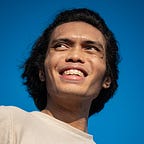Humans of Boracay
Meet the men and women who make paradise work
(This piece won Third Place in the 1st Backpack Journalism Competition during the 11th National Media Conference held at the La Carmela de Boracay Resort Hotel in Boracay Island, Malay, Aklan last September 14, 2017. It has been edited purely for technical reasons.)
Glitz and glamour — this is what attracts every hopeful traveler to the island paradise that is Boracay. It is a life that the ordinary Filipino hopes to catch a taste of: the whitest sand, the grandest resorts, the wildest parties. But as it is said, there are two sides to every story, and the real humans of Boracay — the people behind the scenes — each have their own stories to tell.
They are not tourists, nor are they wayward souls looking for solace crashing along the waves. These humans are the ones along the sidewalk: the vendors, the natives, the tour guides, and all those who keep the world of Boracay an oblate spheroid. Unlike the escapade that the tourists encapsulate in their heads, these humans fill their days with staying alive — feeding their families, making visitors happy, and earning their daily bread.
“My father came here first. You know, in Mindanao, there’s no livelihood there. He came here by 1999 and brought all of us here by 2002. Life is hard there,” recounted Paula, a shopkeeper in Boracay who traces her roots from Lanao del Sur, thirty minutes from the city of Marawi. Boracay is not only a melting pot for foreigners chasing the Philippine sun, but for Filipinos chasing the glorious peso, and she is an affirmation to this.
“This is where our livelihood is. My other siblings have finished school and, at any case, it’s really different [as opposed to staying in Mindanao].”
Being a resident for 15 years, she has been a witness to how this island has transformed from a quiet hideout for adventure chasers to one of the Philippine’s best vacation spots. “There are many people who live here now, and there are many establishments now.”
Janoden, a native of Marawi who has made Boracay his home for the past 11 years, echoed the same sentiment. “Many things have changed, like the buildings for example.” He referred to the resorts which dot the seashore — the unique cityscape that blends the rural seaside vibe with the western party town atmosphere.
Nash, his uncle, pointed out that such buildings are owned by foreigners. “We can’t afford to buy land here,” he added, a difficult thing to live by since their homes were destroyed in a government airstrike during the ongoing liberation of Marawi.
“The land here is worth gold now.”
Yet the struggle does not compromise his calm; “As to the battle between the Maute terrorists and the Government, God will be the judge.” Alican, a fellow Mindanaoan, has accepted his fate. “Masakit, pero kailangan tanggapin (It hurts, but I have to accept it),” he said.
Despite the changes and progress the island has experienced over the years, the distant dreams of a quiet, peaceful Boracay remain in the people’s hearts. Teresa is a jewelry vendor and a native of Boracay, a person passionate about returning the island to a more peaceful time. “Many things have changed. First thing is the lifestyle, second is the establishments. Back then, the structures were native — huts. Although it has become famous, we like the old Boracay better.”
“Back then, when you wake up, you go to swim at the sea. Back then there weren’t as many boats. Also, when you walk around, you don’t bump into people. There weren’t as many vehicles back.”
“It all started when all these investors came in. The government was not able to control them. They’ve gone too far.” She acknowledges the work progress has made, but is not afraid to speak out. “The people in power should put the people of Boracay, the people of Malay first.”
Despite everything, she remains hopeful. “Progress is not only measured by how many people invest in the island, but how people care for it, and I hope people will start caring for it.”
These are the untold stories hidden behind the tourists and the glam. These are the people who work to turn the gears and make paradise work.
“Boracay is a beautiful place, and people are happy here.”
Despite how it has become overshadowed by tourists, the humans of Boracay know that what they do makes people happy, and they’re happy to do it.
